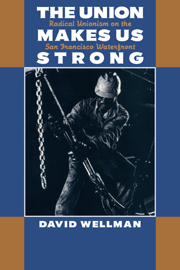Book contents
- Frontmatter
- Contents
- Preface
- Notes on unpublished sources
- PART I LABOR RADICALISM REVISITED
- PART II LOCAL COMMUNITY AND “TUMULTUOUS” DEMOCRACY: THE SOCIOCULTURAL FOUNDATIONS OF UNIONISM ON THE SAN FRANCISCO WATERFRONT
- PART III UNIONISM, WORK, AND TECHNOLOGICAL CHANGE
- PART IV WAGING THE BATTLE FOR WORKPLACE CONTROL ON CONTRACTUAL TERRAIN
- PART V AGREEING TO DISAGREE: BEING DEFENSIBLY DISOBEDIENT
- 13 Translating troubles into grievable issues
- 14 “We essentially have no contract with you”: Keeping the agreement
- 15 Constructing and maintaining the appearance of cooperation
- Conclusion: Trade union exceptionalism or prefigurative politics?
- Appendix: Doing field research: An ethnographic account
- References
- Name index
- Subject index
13 - Translating troubles into grievable issues
Published online by Cambridge University Press: 11 November 2009
- Frontmatter
- Contents
- Preface
- Notes on unpublished sources
- PART I LABOR RADICALISM REVISITED
- PART II LOCAL COMMUNITY AND “TUMULTUOUS” DEMOCRACY: THE SOCIOCULTURAL FOUNDATIONS OF UNIONISM ON THE SAN FRANCISCO WATERFRONT
- PART III UNIONISM, WORK, AND TECHNOLOGICAL CHANGE
- PART IV WAGING THE BATTLE FOR WORKPLACE CONTROL ON CONTRACTUAL TERRAIN
- PART V AGREEING TO DISAGREE: BEING DEFENSIBLY DISOBEDIENT
- 13 Translating troubles into grievable issues
- 14 “We essentially have no contract with you”: Keeping the agreement
- 15 Constructing and maintaining the appearance of cooperation
- Conclusion: Trade union exceptionalism or prefigurative politics?
- Appendix: Doing field research: An ethnographic account
- References
- Name index
- Subject index
Summary
“ARE you willing to stop work?” yelled a business agent into a phone at Matson Terminals in Oakland. “If we don't try to stop them from doing that, it'll continue,” he explained. “Win, lose, or draw, I'd like to try and stop it. Are you willing?” The other person obviously agreed. “Alright then,” said the business agent loudly, “I don't want you to work after lunch. If they want a work stoppage, goddammit they'll get one. Is the rest of your gang willing to stop work, too?” he asked. “Good. Then go tell the walking boss and superintendent that you talked to me and you're hanging the hook. If they want, they can call me at this number.”
The business agent was talking to a longshoreman working in Richmond, across the bay. The man was unloading chrome ore and felt he was being treated unfairly. He therefore called the union and the official was paged by electronic beeper. Once he heard the complaint and assessed the situation, the union officer had to figure out a course of action. His decision rested on two considerations: Were the longshoremen willing to stop work and act on their complaint? And, could the action be defended contractually? When he determined that the work stoppage could be defended, and used strategically, he told the longshoremen to stop working.
- Type
- Chapter
- Information
- The Union Makes Us StrongRadical Unionism on the San Francisco Waterfront, pp. 255 - 267Publisher: Cambridge University PressPrint publication year: 1995



